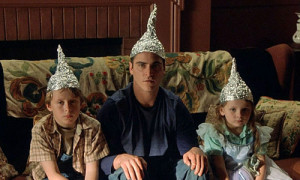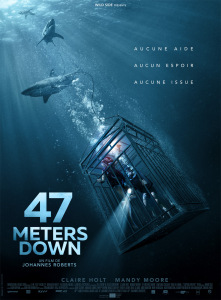All Is Lost is the harrowing tale of an unnamed man (Robert Redford) on his damaged yacht in the Indian Ocean. The film runs 106 minutes. It’s harrowing for all of them. Director Chandor knows how to harrow.
The film has a mundane reality about it. Redford has no back story, no character development, almost no “character” at all. The film opens with a mildly damaging voiceover from Redford; he’s doing a combination apology and goodbye. There’s no indication of who he’s addressing–wife, child, maybe he’s a CEO who sailed off on his yacht after Bernie Madoffing, it doesn’t matter. All Is Lost is about Redford’s struggle during a constantly harrowing experience, with failure more and more certain with each passing moment.
But the opening voiceover informs how the viewer perceives Redford and his actions. Well, except when Chandor’s just dirt cheap about it. Redford risks his life (more than usual) to save a package, opens to reveal a gift, then takes a long pause to consider whether he wants to read the note. Chandor dangles revelation and rescue in front of the viewer throughout. But Redford can’t see it, because then he couldn’t be stoic. And Redford’s stoicism is impressive.
Anyway, one damage is how the voiceover affects viewer interpretation of Redford’s behavior. He has maybe six lines of dialogue after his opening voiceover; five of them are on the radio and the sixth is a single word. The other damage is how that opening voiceover fits into the narrative. Voicever, film title card, then a title card setting the film back eight days. Presumably, Redford’s not going to make the recording for eight days. So what’s going to happen in between?
Lots of harrowing boating things, starting with Redford’s yacht colliding with a shipping container while Redford’s asleep below deck. Bad things frequently happen in the film when Redford’s asleep. He’s either a heavy sleeper or a slow waker.
Once the shipping container situation is resolved, which takes most of the “first act,” other disasters befall Redford and he has to try to figure his way out of them. Chandor does a fantastic job making Redford’s actions make sense. Redford’s not talking, most viewers aren’t going to understand his seamanship activites. Chandor’s juggling quite a bit. Redford’s strong performance makes it all work. While Chandor’s composition is good–though occasionally too fixated on the pretty–and Pete Beaudreau’s editing is phenomenal, Redford’s bringing the humanity. He never voices his fears or anything else, which is frustrating since the opening voiceover is very talky; Redford’s just doing it with his psychical perfomance, his expressions, how he moves around the yacht interiors and exteriors.
Going into the second act, the film downshifts. Summary storytelling is over for a while. Redford’s broken yacht is about to get hit by a huge storm. Is he going to survive? Is something else going to go terribly wrong?
And it does. And then something else. And something else. Redford’s sprinting through a micro-disaster movie (which actually might best describe All Is Lost), which changes the pace of the film quite a bit. Then Chandor changes it again around halfway through.
Redford can weather a lot of the pacing issues. Only because the film asks so little of him after a certain point. The more difficult Redford’s reality becomes, the more Chandor pulls away, only to dangle the narrative red herring again. But the movie’s in a far different place and Chandor and Redford have already had some successes. Red herrings can’t bring it home.
Though the herring is so well-prepared, it ends up righting the yacht enough to recover a bit.
Good music from Alex Ebert. Frank G. DeMarco’s photography is fine. The film goes for realism most of the time and DeMarco delivers it. Beaudreau’s editing is the technical standout.
All Is Lost has a great performance from Robert Redford. He just can’t save the ship–Chandor’s style and narrative clash throughout the film, without ever sustaining the right rhythm.
 ★★
★★
CREDITS
Written and directed by J.C. Chandor; director of photography, Frank G. DeMarco; edited by Pete Beaudreau; music by Alex Ebert; production designer, John Goldsmith; produced by Neal Dodson, Anna Gerb, Justin Nappi, and Teddy Schwarzman; released by Lionsgate and Roadside Attractions.
Starring Robert Redford.
RELATED
- OTHER 2013 RELEASES
- More





